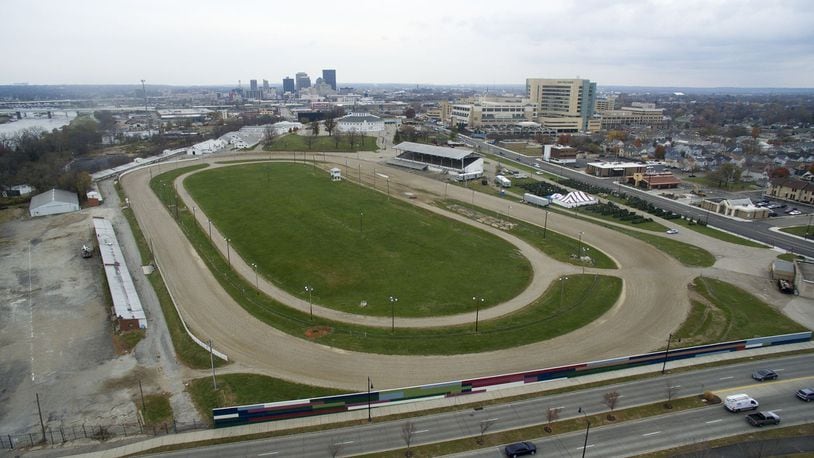But a committee that reviewed the plans has determined they failed to meet the selection criteria, and committee members said they lacked confidence that financial challenges could be addressed.
The city of Dayton is unwilling to spend tens of millions of taxpayer dollars on its own for infrastructure upgrades to support a development project, said Dayton City Manager Shelley Dickstein.
Dickstein and other local officials say they remain hopeful that the property in the future can be remade into a walkable, livable urban district, but it will take a concerted community effort.
“The redevelopment of the fairgrounds is not out of the question, but it is a community project and will require a community solve,” Dickstein said.
Miller-Valentine Group is disappointed that its proposal was rejected, but the firm is still very interested in the property and believes it can be remade into a truly unique and vibrant area, said Dave Dickerson, Miller-Valentine Group’s Dayton market president.
“We’re anxious to see how things evolve and develop,” he said.
Eric Wojak, Thompson Thrift’s Midwest director, said his firm has asked for feedback about what criteria were not met, and will evaluate the responses they receive.
“It’s a head-scratcher … We just need to talk to the county and the city and understand what they were looking for specifically that we did not provide,” he said.
The county issued a request for proposals to transform the site into a dense, mixed-use urban development that offers at least 600 market-rate housing units and retail, dining and office spaces. The minimum bid for the right to acquire and develop the fairgrounds was $15 million.
But a review committee consisting of city, county and fair board representatives have rejected both proposals, saying they did not pass muster.
Both firms are high quality, have proven development records and submitted well-crafted proposals, but the request for proposals spelled out very specific requirements and guidelines that were not met, said Montgomery County Administrator Joe Tuss.
The financial components of the fairgrounds project are challenging, and the committee did not feel confident that the firms could acquire the needed sources of funding by August 2017, which was a key deadline in this process, Tuss said.
The $15 million minimum bid is to help pay to relocate the annual county fair.
“If this was an easy project, it already would have been done,” Tuss said.
The city of Dayton’s primary opposition to the proposals stems from its unwillingness to subsidize the developments with many millions of taxpayer dollars, said Dickstein, the city manager.
The amount of infrastructure assistance being sought from the city far exceeded what it was prepared to invest, Dickstein said.
“They didn’t meet the qualifications in the RFP because it required too much public participation from the taxpayers to meet the infrastructure requirements and close the (financing) gap,” she said.
Public and private stakeholders who want to see the fairgrounds redeveloped must come together to figure out how to close the infrastructure financing gap, city and county officials said.
Miller-Valentine’s proposal was to create more than 800 residential units (649 for rent, 154 for sale), 75,000 square feet of retail and restaurants, 62,000 square feet of grocery space, 250 hotel rooms and 260,000 square feet of offices.
Thompson Thrift’s plan included a specialty grocery store, a hotel, fitness and entertainment offerings, clothing and fashion stores, fast casual restaurants, offices and housing.
Thompson Thrift said its project proposal would create a strong sense of place and reflected the fairgrounds’ cultural and historic heritage, according to its project summary.
The firm would have provided the review committee with additional or amended information if they communicated that the necessary criteria was not being met, said Wojak, with Thompson Thrift.
It is rare for all bids to be rejected for a project like this, he said.
“That being said, if the city and county didn’t have a proposal they were comfortable with, I don’t blame them,” Wojak said. “But we felt we did meet the criteria.”
Major development projects often require public support, and the fairgrounds project carried a fairly large purchase price because of the need to relocate the fair, said Dickerson, with Miller-Valentine.
Dickerson said he hopes his firm will be able to play a role in the future of the property.
“I believe there is still an opportunity to move this project forward, and it’s going to take a community effort to do that,” he said.
Miller-Valentine, which is headquartered in downtown Dayton, is a major player in commercial and residential projects in the region.
The firm has built and developed more than 10 million square feet of commercial property, as well as 15,000 multi-family housing units.
The firm had a considerable head start on the competition: It has worked for several years on plans to acquire and reimagine the property.
In late 2013, Miller-Valentine entered into a two-year option agreement with the fair board to buy the fairgrounds property. But the purchase failed to move forward.
Thompson Thrift, a construction and development company based in Terra Haute, Ind., has a diverse portfolio of completed projects. The firm has built retail centers, mixed-use developments and apartment complexes with upscale, resort-style appearances in more than 100 cities across 16 states.
About the Author
